IWH News – Emerging Tech, Collaborations, and Events
- Meet the Team at the IWH
 The Institute for Water and Heath at Georgia Southern relies on our interdisciplinary team to get things done for our communities on the Georgia Coast and beyond. We use a blend of science, expertise, communication, and technological know-how to answer questions that lie at the intersection of water and health. In this video, produced by… Read more: Meet the Team at the IWH
The Institute for Water and Heath at Georgia Southern relies on our interdisciplinary team to get things done for our communities on the Georgia Coast and beyond. We use a blend of science, expertise, communication, and technological know-how to answer questions that lie at the intersection of water and health. In this video, produced by… Read more: Meet the Team at the IWH
- Meet the Team at the IWH
 The Institute for Water and Heath at Georgia Southern relies on our interdisciplinary team to get things done for our communities on the Georgia Coast and beyond. We use a blend of science, expertise, communication, and technological know-how to answer questions that lie at the intersection of water and health. In this video, produced by… Read more: Meet the Team at the IWH
The Institute for Water and Heath at Georgia Southern relies on our interdisciplinary team to get things done for our communities on the Georgia Coast and beyond. We use a blend of science, expertise, communication, and technological know-how to answer questions that lie at the intersection of water and health. In this video, produced by… Read more: Meet the Team at the IWH - The IWH Celebrates Grand Opening of its Lab with New Federal Funding
 On Monday, March 25th, The Institute for Water and Health celebrated its grand opening and was awarded $2.04 million in federal funding for its Safe Water Together Program. Founding director, Asli Aslan was joined in the ribbon-cutting ceremony by Georgia Southern University President Kyle Marrero, Representative Buddy Carter, Provost Carl Reiber, Vice-President for Research and… Read more: The IWH Celebrates Grand Opening of its Lab with New Federal Funding
On Monday, March 25th, The Institute for Water and Health celebrated its grand opening and was awarded $2.04 million in federal funding for its Safe Water Together Program. Founding director, Asli Aslan was joined in the ribbon-cutting ceremony by Georgia Southern University President Kyle Marrero, Representative Buddy Carter, Provost Carl Reiber, Vice-President for Research and… Read more: The IWH Celebrates Grand Opening of its Lab with New Federal Funding - New IWH Video Highlights Safe Water Together with our Affiliated Faculty
 The Institute for Water and Health is proud to work with Vanessa Countryman, a Georgia Southern Journalism student, in producing a new video about some of the people who make our mission possible. Viewable on the IWH YouTube page, the movie includes interviews with a few of our affiliated faculty and their feelings about partnering… Read more: New IWH Video Highlights Safe Water Together with our Affiliated Faculty
The Institute for Water and Health is proud to work with Vanessa Countryman, a Georgia Southern Journalism student, in producing a new video about some of the people who make our mission possible. Viewable on the IWH YouTube page, the movie includes interviews with a few of our affiliated faculty and their feelings about partnering… Read more: New IWH Video Highlights Safe Water Together with our Affiliated Faculty - RaMP: Mentoring and Research Opportunities for Careers in Coastal Science (MROC2S)
 This opportunity is accepting applications now! The Mentoring and Research Opportunities for Careers in Coastal Science (MROC2S) Program at Georgia Southern University provides year-round mentoring, professional development, and diverse research training opportunities in natural resource science for postbaccalaureate participants. MROC2S aims to develop a strong and inclusive research and technical skills program that produces a… Read more: RaMP: Mentoring and Research Opportunities for Careers in Coastal Science (MROC2S)
This opportunity is accepting applications now! The Mentoring and Research Opportunities for Careers in Coastal Science (MROC2S) Program at Georgia Southern University provides year-round mentoring, professional development, and diverse research training opportunities in natural resource science for postbaccalaureate participants. MROC2S aims to develop a strong and inclusive research and technical skills program that produces a… Read more: RaMP: Mentoring and Research Opportunities for Careers in Coastal Science (MROC2S) - Environmental Education and Teacher Development the Focus of Grant to Georgia Southern Team
 The IWH is part of a multidisciplinary team from Georgia Southern that was awarded a grant from the National Academies of Sciences, Engineering, and Medicine to work with educators and students to provide hands-on experiences in watershed science, biology, and chemistry. The funded project, “Suwannee Watershed: Assessment and Monitoring of Place to Gain Understanding of… Read more: Environmental Education and Teacher Development the Focus of Grant to Georgia Southern Team
The IWH is part of a multidisciplinary team from Georgia Southern that was awarded a grant from the National Academies of Sciences, Engineering, and Medicine to work with educators and students to provide hands-on experiences in watershed science, biology, and chemistry. The funded project, “Suwannee Watershed: Assessment and Monitoring of Place to Gain Understanding of… Read more: Environmental Education and Teacher Development the Focus of Grant to Georgia Southern Team - Transdisciplinary Work Makes for a Busy Week for the IWH!
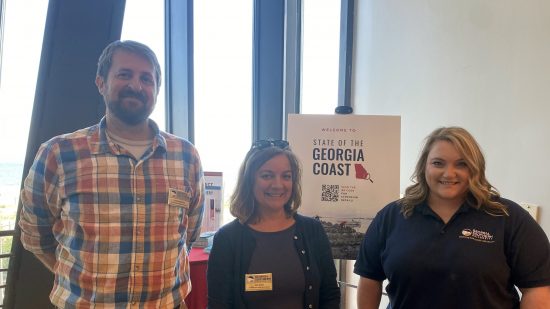 Last week, IWH staff presented their work at two conferences in coastal Georgia. The differences between the themes and audiences illustrate the need for transdisciplinary research that the IWH provides in our region. Wednesday, Dr. Asli Aslan spoke at the Georgia Environmental Health Association (GEHA) on Jekyll Island, where she emphasized the impacts of water… Read more: Transdisciplinary Work Makes for a Busy Week for the IWH!
Last week, IWH staff presented their work at two conferences in coastal Georgia. The differences between the themes and audiences illustrate the need for transdisciplinary research that the IWH provides in our region. Wednesday, Dr. Asli Aslan spoke at the Georgia Environmental Health Association (GEHA) on Jekyll Island, where she emphasized the impacts of water… Read more: Transdisciplinary Work Makes for a Busy Week for the IWH! - IWH Receives Grant From Partnership For Inclusive Innovation For Safe Water Together In Glynn County
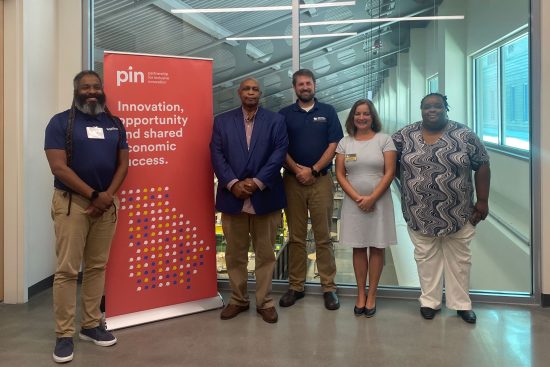 STATESBORO, GA, 09/06/2023—The Institute for Water and Health, along with partners at Rebuilding Together Glynn County, the City of Brunswick, The Office of Health Equity and Community Engagement at Georgia Southern University, and the Georgia Technical Institute for People and Technology has been awarded a grant from the Partnership for Inclusive Innovation (PIN). “This grant… Read more: IWH Receives Grant From Partnership For Inclusive Innovation For Safe Water Together In Glynn County
STATESBORO, GA, 09/06/2023—The Institute for Water and Health, along with partners at Rebuilding Together Glynn County, the City of Brunswick, The Office of Health Equity and Community Engagement at Georgia Southern University, and the Georgia Technical Institute for People and Technology has been awarded a grant from the Partnership for Inclusive Innovation (PIN). “This grant… Read more: IWH Receives Grant From Partnership For Inclusive Innovation For Safe Water Together In Glynn County
Protecting a Priceless Treasure – Asli Aslan Leads New Institute for Water and Health

Fall 2022 Issue of Georgia Southern Magazine
“As an environmental health scientist, trust me, I have seen the worst in my life,” said Asli Aslan, Ph.D., associate professor in the Jiann-Ping Hsu College of Public Health and director of the new Institute for Water and Health at Georgia Southern.
A water microbiologist with an international reputation, Aslan has spent her career testing water sources around the world for possible contamination.
On a chilly April morning, Aslan and Luke Roberson, a public health doctoral student, waded into the frigid waters of the Ogeechee River at Kings Ferry beach in Savannah, Georgia. Armed with a multiprobe, a device that can measure temperature, conductivity, pH and dissolved oxygen in the water, Roberson tested samples while Aslan, carrying a notebook just above the water, recorded the results.
A popular spot for campers, boaters, skiers and swimmers, Kings Ferry beach had been closed in 2015 for years due to high levels of bacteria in the water from an unknown source. Looking to find a solution, the Georgia Department of Natural Resources (DNR) reached out to Aslan for help.
Using new molecular testing technologies, Aslan and her team took samples around the contaminated site for a year before they found the culprit — a toilet near the park leaking sewage onto the beach.
“DNR investigated the area, fixed the leak, and the next month there was no pollutant,” said Aslan. “Problem solved. Check.”
“I love this part of my job a lot,” she added.
Click here to read the rest of the article in Georgia Southern Magazine
IWH and Sustain Southern Hold Discussion Panel with Students and Faculty
April 7, 2022
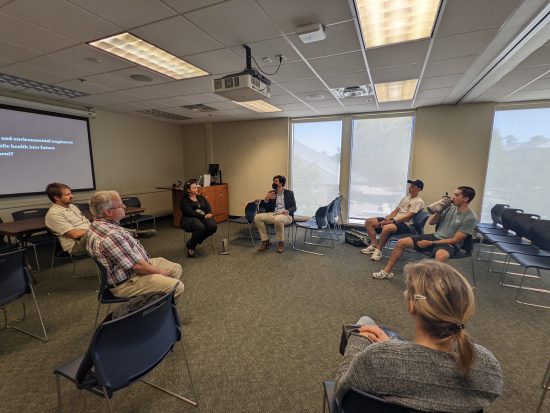
As part of Sustainability Week at Georgia Southern, the IWH brought together members of its affiliated faculty and students to discuss issues of sustainability at the intersection of water and public health. The subject of water is transdisciplinary – meaning touches on many different professions, sciences, and life experiences. Faculty expertise from engineering, education, chemistry, biology, and public health viewpoints brought a health discussion with student input. We look forward to more of these conversations between faculty and students.
IWH presents at Georgia Adopt A Stream Confluence meeting
March 23, 2022
Dr. Asli Aslan, Director of the IWH, spoke about the threats to water quality in coastal Georgia and how water quality monitoring is evolving to meet challenges brought about by Sea Level Rise and Climate Change. Moderated by Community Engagement and Outreach Coordinator Luke Roberson, the panel discussed education, water quality, Community-Based Participatory Research, and Environmental Justice. Panelists included teachers from Tybee Island Maritime Academy, volunteer coordinators from UGA, informal educators from the Tybee Island Marine Science Center, and research students from UGA and Georgia Southern. Luke is a board member of the Adopt A Stream (AAS) program and has been a community trainer since 2017.
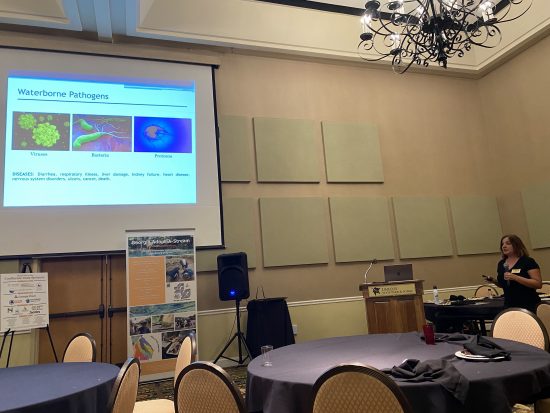
IWH staff talks about water quality with Effingham middle schoolers
January 24, 2022

IWH staff joined Kania Greer from Georgia Southern University’s Institute for Interdisciplinary STEM Education to talk to middle school students from Effingham County at the Honey Ridge Agricultural Center. Luke Roberson taught the kids how to do simple water quality tests, and what they meant for the ecosystem in the water and the people around it, while Kania Greer went over the importance of macroinvertebrates to water monitoring. Over 90 students came through the two learning tables. The IWH makes a point to work with K-12 students and educators on how to communicate science in a fun and transferrable manner.
Georgia Southern establishes new institute to better address challenges related to water and human interactions
November 2, 2021
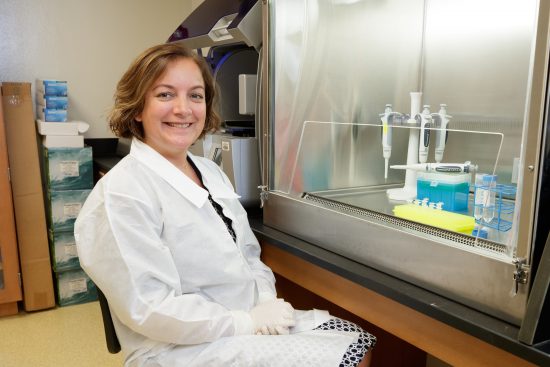
“We want to create a nationally recognized institution that provides meaningful solutions for community needs”
- Dr Asli Aslan, Director
Georgia Southern University has established a new research and outreach center, the Institute for Water and Health, to investigate the complex interactions between water and human activities, and protect and restore public health in a changing environment.
As part of the University’s focus on public impact research, the center will foster collaboration among scientists, government agencies, industry, nonprofit organizations, and communities.
Coastal Georgia is the perfect location for such an institute to conduct interdisciplinary research because it lies at the intersection of many social, economic and ecological issues. The center supports the region through research, workforce training for students, and actively involving communities in the water resource management decision-making process, said Asli Aslan, Ph.D., associate professor in Georgia Southern’s Jiann-Ping Hsu College of Public Health Department of Biostatistics, Epidemiology, and Environmental Health Sciences.
Now also director of the Institute for Water and Health, Aslan is a water microbiologist, and her research program bridges ecosystem and human health. She has ongoing funded projects on tracking sources of water pollution and assessing health risks associated with exposure to chemical and microbial contaminants. She works with local communities and non-profit organizations to encourage water stewardship behaviors. Aslan has served in various federal and state agencies and organizations as an adviser, reviewer, scientific committee member, and affiliated faculty. She is also the founder and currently the co-chair of the Water and Health Committee of the American Public Health Association.
“We want to create a nationally recognized institution that provides meaningful solutions for community needs,” said Aslan. “Our immediate plan is to develop a coalition with all stakeholders in the region to address issues related to increased water demand, the impact of sea-level rise on water resources, and potential emerging contaminants in our urban and rural water infrastructure. We are in the process of establishing a community advisory group consisting of scientists from academic institutions, representatives from local and state governments, community leaders, non-profit organizations, and businesses to identify and prioritize community needs in water research and education.”
For example, she said, although one in every six households in Georgia has a private well, few residents realize any water testing, treatment or well maintenance is the sole responsibility of the property owner as per the Safe Drinking Water Act. Aslan said the Institute for Water and Health will work with the homeowners to help them recognize potential risks and provide solutions that will keep families safe in the long term.
“We also look at sources of contaminants using state-of-the-art methods. And if you know where the pollution is coming from precisely, it’s easier to go fix that problem once and for all, which has a direct impact on the decision-making process to protect water resources,” she said.
These new techniques allow researchers with the institute to provide test results within a few hours, which helps end-users to be informed the same day instead of days where most water testing methods currently take about 48 hours. The implications of these methods are broad, as they can be used to identify pathogens in stormwater or in household drinking water pipes; assess how new sustainable water treatment technologies efficiently remove contaminants or provide same-day results for recreational beach monitoring.
“We can do all this fancy research in the lab, but it will be very important for us to go out into the community and talk to people, ask them what their immediate needs – our goal is to involve communities from the very beginning of our research so that we co-develop meaningful solutions that will improve the quality of their everyday lives,” Aslan said. “Our group at Georgia Southern consists of established researchers from multiple disciplines such as environmental education, public health, social and behavioral sciences, environmental and computational engineering, coastal ecology, and we are growing every day”.
Carl L. Reiber, Ph.D., Georgia Southern’s provost and vice president for academic affairs said the center will pull together faculty from across the University, many of whom have already established themselves as water experts within their own discipline. He expects the center to take a very visible role for the University and is renovating space in Savannah near the Armstrong campus to house the center and its labs.
“The Institute for Water and Health will bring to southeast Georgia an awareness of the importance of water quality, water management and how tightly these areas are aligned with our health,” Reiber said. “The public impact of this institute is immeasurable and will ultimately increase the quality of life in our community.”
Last updated: 11/1/2023
